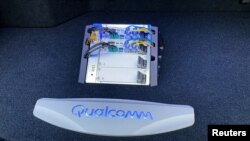For decades, American conservative politicians have championed the power of the free-market economic model to determine which companies succeed and fail. The government, they argue, is better off letting competition in the U.S. economy determine which businesses thrive. In most cases, the government should not intervene.
Now, when it comes to semiconductors, the electric components inside every high-tech product, conservatives argue the government needs to step in and financially support American companies.
When the Senate called a vote in July that would direct billions of federal dollars to semiconductor manufacturers, nearly every Republican supported it.
The measure will provide semiconductor manufactures with $3 billion in federal funding, calls for a national strategy for the semiconductor industry and the establishment of a national semiconductor technology center.
The reason for the shift on conservative thinking is China, said Robert Atkinson, president of the Washington based Information Technology and Innovation Foundation.
He said for the past few decades, there was a sense among most mainstream Washington politicians that China was going to be a responsible global actor.
“That view now has been largely rejected,” he said.
“So that has really changed the landscape, and made more people on both sides of the aisle understand that we've got to make sure that we're stronger than China,” Atkinson continued, “We have to have much stronger technology base to support our military capabilities against the Chinese should we need them.”
American companies are at the forefront in designing the cutting-edge semiconductors that advance the capabilities of high-tech products. That means the U.S. takes nearly half of global chip sales revenue, yet American production capacity stands at only about 12%.
China, while lagging behind in the most advanced semiconductor technology, is investing heavily in the industry and has made that a priority in its industrial policy. For the last three years, China has been the world’s biggest importer of semiconductors, spending more than $300 billion buying them each year.
Zhaohui Chen, a professor at UVA’s Mclntire School of Commerce, said U.S. lawmakers are coming to understand how the free market model that pushed semiconductor manufacturing to other countries has made the United States more vulnerable.
“If your supply chain is too dependent on other countries, such as China, it will strategically lead to your insecurity,” he told VOA.
Industrial policy, Republican style
Analysts say the Republican Party’s support of the semiconductor bill shows that some are reconsidering their laissez-faire orthodoxy with a wary eye on China.
“The free market doesn't have any incentive to protect national security,” said Senator John Cornyn, a Texas Republican who sponsored the bill.
“Just like in the semiconductor area, we have to acknowledge the fact that China is not constrained by the similar ideology. In fact, they're investing huge amounts of money so they can be the leader in the world in these areas,” he told VOA.
Senator Marco Rubio, a Florida Republican, argues that the efficiency generated by the market is not necessarily beneficial to the United States society as a whole.
“The market will always reach the most efficient economic outcome, but sometimes the most efficient outcome is at odds with the common good and the national interest,” he said in a speech at the National Defense University last year, adding that outsourcing jobs to China may be efficient, but it has led to loss of employment opportunities in the U.S.
He has been advocating for an industrial policy for the past year, saying there’s an urgent need for American policymakers to set and pursue economic priorities in order to counter a growing China. He called it the 21st Century Pro-American Industrial Policy.
“We're not talking about state owned enterprises. We're not even talking about national champions that we choose,” he told VOA Mandarin, “It is about creating investment incentives for private sector investment in these important fields … and investment in basic research that can be taken by the private sector and apply to commercial solutions that are of benefit to the country.”
The Debate
An industrial policy is a country’s strategic effort to encourage the development and growth of all or a certain sector in the economy. Examples include subsidies, tax incentives and government preferential loans.
Supporters say that the United States has always relied on public-private collaborations to further national interest. Private companies that make weapons and supplies for the U.S. military are one example. Laws prevent those companies from using the technology shared by the government to sell some weapons to foreign countries. Senator Rubio said that policy which was put in place after the World War II has benefited multiple industries from aviation to steel.
Yet critics say industrial policies can be dangerous, because they can mean that political leaders will make economic decisions for political purposes. In the long run, many economists are skeptical that government officials will do better at funding specific technology and companies than investors.
“There is not much evidence that government has better insight than private firms on choosing the best frontier technologies,” said Gary Hufbauer, a veteran economist at the Peterson Institute for International Economics. “Globally speaking, industrial policy has far more failures than successes.”
Thomas Duesterberg, an economist at the Hudson Institute, said in an interview that he agrees with Senator Rubio’s vision on providing support for the core industries that directly impact national security, yet he also said such industrial policies are too vague and will “leave us open to political influence of what types of technologies we are supporting.”
There are also a few other bills aimed at supporting different sectors of the economy this year. Senator Todd Young, an Indiana Republican, and Representative Mike Gallagher, a Wisconsin Republican, jointly proposed with Democrats the Endless Frontier Act in May, advocating for $10 billion to establish regional technology hubs across the country to support tech start-ups.
The bill also calls for the expansion of the National Science Foundation, increasing its funding by $100 billion over five years for artificial intelligence, robotics and advanced manufacturing fields.
Ten members of Congress, including Republican Senators Tom Cotton of Arkansas, Josh Hawley of Missouri and Susan Collins of Maine, proposed the American Foundries Act of 2020 in July to provide financial support for the chip manufacturing industry.
Atkinson said although there’s more mention on government intervention, the Republican Party as a whole still supports the free market approach.
“There are more Republicans still in the free market camp than there are in the industrial strategy camp. Now that's changing to be sure, the core of the Republican Party still is a free market party,” he argued.
UVA’s Chen believes that the current consensus is that a completely free market approach will not work. “The government needs some intervention, but the difference lies in how and how much,” he said.






